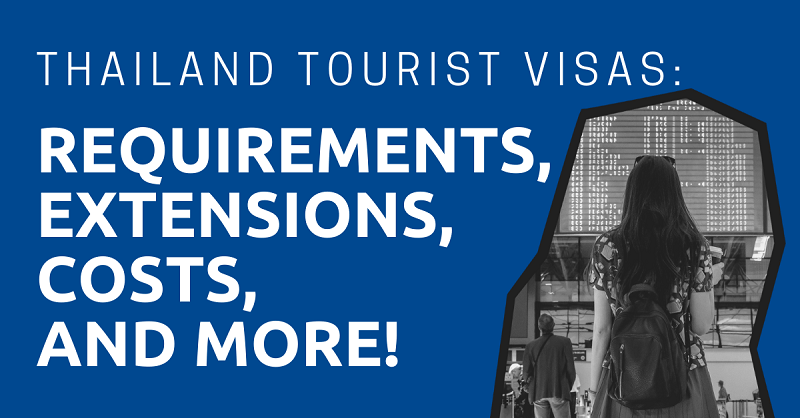
If you’re planning your trip to Thailand and trying to figure out which Thailand tourist visa you’ll need, then you’ve landed on the right page.
In this guide you’ll find out which tourist visa is right for you, the requirements for getting a tourist visa, how to apply for and extend your tourist visa, and lots of other useful tidbits.
"*" indicates required fields
Disclaimer: This article may include links to products or services offered by ExpatDen’s partners, which give us commissions when you click on them. Although this may influence how they appear in the text, we only recommend solutions that we would use in your situation. Read more in our Advertising Disclosure.
Contents
What is it?
A Thailand tourist visa lets non-Thais come to Thailand for the purpose of traveling, visiting friends and family, getting medical treatment, or attending meetings, conferences, seminars, and similar events.
The amount of time you can stay in Thailand on a tourist visa depends on which type of visa you have, by typically you’ll get either 30, 60, or 90 days before extensions.
How Many Types are There?
In general, you have four different options with Thailand tourist visas: visa-exempt stamp, visa on arrival, single-entry tourist visa, and multiple-entry tourist visa. Visa-exempt stamps and visas on arrival are only available for residents of certain countries. See which visa you qualify for below.
Visa-exempt Stamp
A visa-exempt stamp, or tourist visa waiver, lets eligible foreigners stay in Thailand for up to 30 days without a visa. To qualify for this visa, you must come from one of the 57 countries in the above chart which have the 30-day tourist visa agreement with Thailand.
If you are eligible for the visa-exempt stamp, you can come to Thailand without having to get a visa in advance. But it’s still a good idea to have a proof of onward travel, passport that’s valid for more than 6 months, and proof of funds with you to prevent a denied entry.
*Starting October 1st, 2022, to March 31st, 2023, Thailand allows over 30 nationalities to stay in Thailand for 45 days under the visa exemption scheme. You can see a full list of nationalities from The Royal Thai Embassy in Oslo website. From April 1st, 2023 onward, the visa-exempt stamp now only gives you 30 days in Thailand.
Visa on Arrival
If you’re from one of the countries on the left in the above chart then you’re eligible for a 15-day visa on arrival when you travel to Thailand by air. To qualify for a visa on arrival, you must show proof of onward travel dated no later than 15 days from the date you enter Thailand.
Bus, train, or van tickets with no fixed return date are not considered proof of onward travel.
The Royal Thai Embassy in Singapore lists the Thailand Immigration checkpoints where you can apply for a visa on arrival.
Single-entry Tourist Visa
If you want to stay in Thailand for up to 90 days, you can get a single-entry tourist visa (SETV). With this visa, you’ll be given an initial 60 days in the kingdom, starting on the day you enter Thailand. Afterwhich you can extend for another 30 days.
Normally, a tourist visa will be available for 90 days after your visa is approved. You must enter Thailand before the ENTER BEFORE DATE on your visa.
If you don’t, your visa will expire. If you leave Thailand while on a single-entry tourist visa, it will also expire–unless you get a re-entry permit.
Multiple-entry Tourist Visa
If you want to stay in Thailand for more than 90 days, getting a multiple-entry tourist visa (METV) is the way to go. With this visa, you can exit and enter Thailand as many times as you’d like during the visa’s six-month validity. Since you’re allowed to come and go as many times as you’d like, you can get a total of 270 days on the visa.
Unlike with single-entry tourist visas, you don’t have to get a re-entry permit when leaving Thailand on your multiple-entry tourist visa. But you have to apply for the multiple-entry tourist visa at a Thai embassy in your country.
The Royal Thai Consulate General in Melbourne is an exception. They let non-Australians apply for multiple-entry tourist visas.
Thailand Elite Visa
The Thailand Elite Visa is a privilege visa in Thailand. Although it is for those who want to stay in Thailand long-term, it’s considered a tourist visa.
It lets you stay in Thailand from five to 20 years as if you can pay the application fee and don’t have a criminal background.
What are the Requirements?
Different rules apply to different nationalities, but one requirement governs everyone who’s applying for a Thailand tourist visa: a passport with at least six months validity. This is a simple requirement, but you shouldn’t overlook it.
If you have had to re-enter the country several times, you may be asked for proof of funds and proof of onward travel as well.
Passport
You need to have a passport with at least six-month validity.
Although many people won’t have any trouble getting into Thailand of they don’t have at least six months validity on their passport., one person’s experience will be different from another person’s.
This means you can have a passport that’s only valid for three months and have no trouble with Thai Immigration, or you can have a passport that’s still valid for six months and be denied entry.
When it comes to foreign immigration laws, the cardinal rule is: you’re better off being safe than sorry.
Proof of Funds
You need to show proof of funds, 20,000 baht per person and 40,000 per family, when applying for a tourist visa and a visa on arrival.
Even if you come to Thailand on a visa exemption scheme, you may still need to show it.
Immigration officers might ask for proof of financial means based on one of the Immigration Act of Thailand’s rules regarding “Having no appropriate means of living following entry into the Kingdom.” However, this rarely happens.
Having proof of adequate funds as a means to re-enter the country has been a subject of inquiry for many.
Proof of Onward Travel
Aside from proof of funds, you’ll have to show proof of onward travel; for example, a plane ticket dated no later than 30 days from your date of entry into Thailand. Overland travel tickets by bus, train, or van, and tickets with no fixed return date don’t count.
Again, with the exception of nationalities under the visa on arrival rule, you’ll rarely be asked to show a return ticket when traveling in and out of the country. However, if you’ve made several entries–regardless of the number of days in between each entry–there’s a good chance you’ll be asked to show proof.
What are Some Restrictions?
Despite popular belief, you can’t do anything and everything with a Thailand tourist visa. Here are a few important restrictions.

Abusing Visa-exempt Stamp
Because border-bouncing foreigners have been taking advantage of the visa-exempt stamp, Thai Immigration officers have become privy to their abuse.
Thai Immigration counts the number of entries on a passport under a visa-exempt stamp. While they don’t count back-to-back entries, they do count the total number of visa-exempt stamps you’ve had.
For example, if you’re from Singapore and come to Thailand once a month over the course of a year, your coming and going will raise a red-flag with Thai Immigration, even if you stay in Thailand for only a day.
This doesn’t mean, however, that you will be banned from entering Thailand, it just means Thai Immigration is likely to question your motives for wanting to enter Thailand.
If this happens, you can show proof of onward travel or proof of financial support. This might help. But ultimately, whether or not you’re allowed in Thailand will lie in the hands of the immigration officer, who will asses your entry based on your passport’s history, and decide from there.
But if you travel to Thailand on a visa-exempt stamp frequently and leave when you’re supposed to, you shouldn’t run into any problems with Thai Immigration. They may question you, but if you’re following the rules, you’ll be okay.
If you come to Thailand by flights, you may come in and out of Thailand as many times as you want, as long as you have good reasons that you are not abusing it.
While you’re not exactly violating any immigration laws, abusing this privilege will eventually raise a red flag. You’re not going to find an official list of rules that says the number of times you can get away with constantly getting a visa-exempt stamp.
But suspicious travel patterns will have immigration officials taking a closer look at your visas.
Single-entry and Multiple-entry Tourist Visa
If you apply for back-to-back single entry tourist visas you will raise red flags with Thai Immigration officers.
You shouldn’t have more than three to five tourist visas in your passport at any given time.
But even if you get a new passport, immigration officers can verify the number of times you’ve applied for a tourist visa. And if you try to beat the system by extending your tourist visa for 30 days by doing a border run, and then repeat the process, expect immigration officers to question you.
Again, you may not be violating any immigration laws, but by not getting the right visa for your long-term stay in Thailand could make immigration officers wonder whether you’re in Thailand for tourism, or work.
Which leads to my next point. If you’re looking for a job in Thailand while on a tourist visa, and you get a job, you’ll have to leave Thailand and return with the right visa.
What Can You Do With It?
Despite some of the limitations you’ll face with a tourist visa, they do give you some great perks while you travel in Thailand.
With your tourist visa you can open a Thai bank account. To do other things, like buy a car, teach English, or start a business in Thailand, read our in-depth guide to Thai visas to find out which visa you must get.

Where Can You Apply?
The application process for your Thailand tourist visa will depend on which country you’re in. Below is a list of Thai embassies in popular locations outside of Thailand. Each link points to the respective embassy’s website, where you’ll find applications and instructions on how to apply for a Thailand tourist visa.
Keep in mind that you can apply for a single-entry tourist visa in any country with a Thai embassy. But if you’re applying for a multiple-entry tourist visa, you’ll need to do so in your home country.
Australia
Belgium
Canada
China
Finland
Germany
Hong Kong
Ireland
India
Italy
Japan
Singapore
Vietnam
UK
USA
- Royal Thai-Consulate-General, Chicago
- Royal Thai Consulate-General, Los Angeles
- Royal Thai Embassy, Washington DC
- Royal Thai Consulate-General, New York
How Much Does it Cost?
The cost of your Thailand tourist visa will depend on which country you’re from. Above is a list of Thai embassies in popular locations outside of Thailand. Each link points to the respective embassy’s website, where you’ll find applications, requirements, and visa costs.
On average, though, you’ll usually pay 1,900 baht for a single-entry tourist visa and 5,600 baht for a multiple-entry tourist visa, depending on your currency and exchange rates.
How Do You Get an Extension?
If you want to extend your visa-exempt stamp for 30 days, you can do so at most Thai Immigration offices. If you’re from India, keep in mind you’ll get a 7-day extension.
Keep in mind that the application process, requirements, and fees for extending your visa-exempt stamp and single-entry tourist visa are the same.
If you have a visa on arrival, you can’t get an extension unless you’ve fallen ill in Thailand. In this case, you can apply for a 7-day extension at an immigration office in Thailand for 1,900 baht, or a 15-day extension for 1,000 baht. If you’re denied a 15-day extension, immigration officials will give you an “Extension Denied Stamp,” which will usually give you 7 extra days anyway.
Documents
To extend your visa-exempt stamp or tourist visa, you’ll need the following:
- 1,900 baht 7- or 30- day visa extension fee
- passport valid for at least six more months
- 4cm x 6cm photo, taken in the last six months
- copy of your passport, and entry stamp
- application form, which you can download on the Immigration Bureau’s website
- your contact details: address and cell phone number
Application Process
When you extend your visa-exempt stamp or tourist visa in Thailand, it’s a straightforward process, only slowed down by long lines. Most immigration offices in Thailand open from 8:30am to 4:30pm. And most offices stop handing out queue numbers after 3:00pm. Get there before 2:00pm if you want to handle you visa extension in one day.
Queuing up starts in the wee hours of the morning, long before immigration opens up. So be sure to get there early—like 6am. Once you’re inside, go to the info counter and get the necessary forms. Fill in the TM.7 visa extension form, and attach your photo.
Go to the next room and a get a queue number and wait for your number to come up on the digital display. When you get to the immigration officer’s desk be polite, patient, and personable. The immigration officer will ask you your purpose of extension, in which you can give any number of valid reasons—although “I love Thailand” always works best.
Locations
Below are a few popular areas to extend your tourist visa.
Bangkok
If you’re in Bangkok you can apply for an extension at the Division 1 Immigration Office in Chaengwatthana (link to Google Map). The office is open Monday through Friday, except on Thai holidays.
Chiang Mai
If you want to extend your visa in Chiang Mai, have a look at Chiang Mai Buddy’s guide on extending visas in Chiang Mai. You’ll find immigration office location and directions, hours, requirements, procedure, and applicants’ experiences in the post.
Chiang Rai
If you’re in Chiang Rai, you’ll be hard up to find quality info on extending your visa there. But this guide from Thai immigration is helpful—if you can read Thai or have a Thai translator.
Phuket
If you want to extend your tourist visa in Phuket, you have two choices. Your first choice is in Phuket Town (link to Google Map). Your second choice is in Patong Beach (link to Google Map).
Travelfish does a great job of covering the visa extension process in Phuket. The post is complete with requirements, locations, hours, and even border run options.
Other Locations
If you’re in an area other than one listed above, you can extend your tourist visa at another immigration office in Thailand. Pattaya Immigration, Samui Immigration, and Korat and three more popular places.
Here’s a map of Thailand Immigration Offices and a list of Thai Immigration Offices.
What Happens if You Overstay?
If you overstay your tourist visa in Thailand, you’ll have to pay 500 baht per day you stay in the kingdom past your visa’s expiration date. Usually, the fine won’t be more than 20,000 baht if you overstay for 40 or more days.
If you slip up and forget to extend your visa or apply for a new one, and you overstayed your visa’s expiration date, head to one of the immigration offices in Thailand to sort things out immediately.
If they come looking for you, or find that you’ve overstayed your visa during a random check, it could lead to you being detained or blacklisted from Thailand.
Now, on to You
Thailand tourist visas are one of the easiest visas to apply for in Thailand. And if you’re looking to stay in Thailand for under a year, they’re also your best choice. But depending on which country you come from, your application process and requirements may or may not be similar to other applicants. So be sure to go back and read through this guide thoroughly.
And don’t forget to get travel insurance in case you get sick or injured in Thailand.

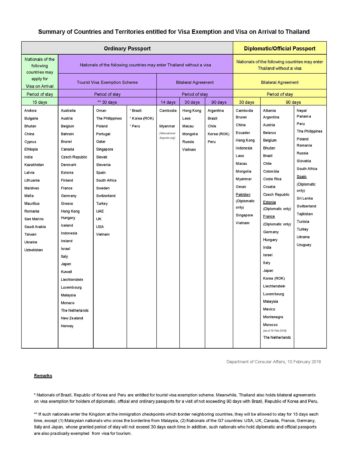


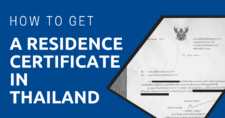
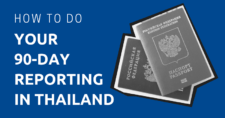


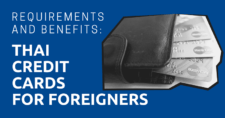
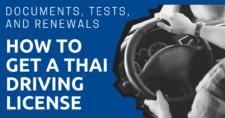
to extend the visa to Thailand we must show to the immigration a return ticket or ticket that you leave Thailand.
I use trixo.net for this without booking the actual ticket.
Good post tho!
Hi Sir,
I have a free 14 day -visa and I am staying in Thailand, wanna extend it for 30 day- visa. Is it possible ?? Many thanks for your reply
I only have one Tourist visa, 2 visa exempt one and 1 extension, is it possible that i will be granted another tourist visa?
It’s hard to say. If you get all those visas under the same year, it’s possible that you won’t get another visa. Or in case you get it, there’s still a chance that the immigration officer at the airport will reject your entry.
But if you get it in a different year. And it looks like you are here for “traveling” not for other purposes, then, you should have no problem getting it.
Great article, Really interesting to read. It will be very useful when planning a trip to Thailand.
Iam going Thailand may or June next year how many add ons can I get meaning extension tourist visas